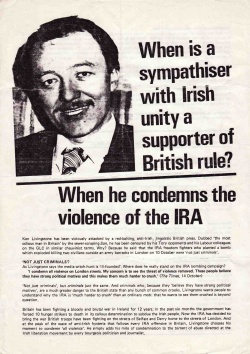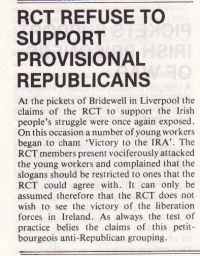Smash the Prevention of Terrorism Act Campaign
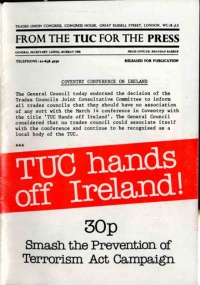
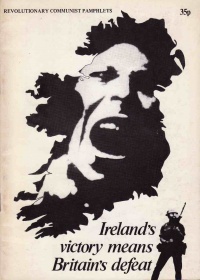
The Smash the Prevention of Terrorism Act Campaign was a front group created by the Revolutionary Communist Tendency in 1979. It was one of the vehicles for RCP work on Ireland until it was subsumed into the Irish Freedom Movement in February 1982.
Contents
Beginnings
The Smash the Prevention of Terrorism Act Campaign was created in late 1979 by the Revolutionary Communist Tendency. According to their own account: 'Towards the end of 1979 we decided to focus our activity in the labour movement on opposition to the PTA. We organised a national demonstration in November and the Smash the PTA Campaign was launched shortly afterwards.'[1]
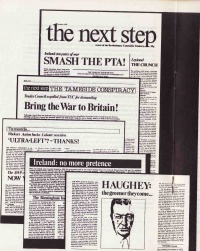
The demonstration was held on 24 November 1979 and the campaign was launched via a leaflet given out to marchers advertising the 'first planning meeting' at Friends House near Euston in London on 13 December 1979 as well as the launch meeting in London planned for 1 February and its 'National conference' on 24 May 1980.[2] The leaflet argued that there were three good reasons why a campaign was needed. these were the 'defence of PTA victims', the need for up to date facts and figures' to be circulated in a 'news bulletin' and thirdly the need for 'anti-imperialist politics': 'workers will not oppose this Act consistently unless they are convinced of the need to support the war that is being waged against Britain.' 'Anyone', the text continues, 'who accepts the view that "terrorism" must be stopped - however well meaning or humane they might be - is in no position to fight the PTA.[2] This showed that the campaign was not conceived of as a broad campaign to oppose the PTA but as a vehicle to develop the RCT position. Of course the ultimate aim of that was to build the RCT on the basis of other left and Irish solidarity groups joining the SPTAC. This is striking shown in the section of the leaflet which lists the supporters of the march (including a range of left/socialist groups, the United Troops Out Movement, some union branches and both Provisional Sinn Fein and the Irish Republican Socialist Party). The leaflet urged all these groups to give their 'anti-imperialist politics some real content', by joining the SPTAC. Presumably the organisers were of the view that Sinn Fein and the IRSP had an anti-imperialist politics politics devoid of 'real content'.[2]
This sectarian approach was the culmination of a number of meetings held by the RCT in the run up to the march which resulted in clashes with another left group, the RCG, from which the RCT had been expelled some two years earlier.
Such conflicts continued between the two groups for some time. A report in the RCG Quartertly Hands Off Ireland! in April 1980 claimed that RCT members at an Irish solidarity picket of Bridewell prison in Liverpool 'vociferously attacked' those who started chanting 'Victory to the IRA!' and 'complained that the slogans should be restricted to ones the RCT could agree with'. Hands Off Ireland! continued sardonically, 'it can only be assumed therefore that the RCT does not wish to see the victory of the liberation forces in Ireland', and denounced what they called 'this petit-bourgeois anti-Republican grouping'.[3]
Activities
Bring the War to Britain
- In March 1980 the SPTAC 'occupied Congress house in protest at the TUC bans on Irish solidarity'[4]
Attacking Ken Livingstone - October 1981
Labour movement conference on Ireland - February 1982
The SPTAC issued leaflets supporting the Bloody Sunday commemoration march called by Sinn Fein on 31 january 1982. The leaflet called on supporters to march o the SPTAC contingent. It claimed that mobiliiising committees had been set up in North, South and East London as well as Coventry, Manchester, Leeds, Canterbury and Portsmouth, reinforcing the evidence that the RCT was, at that stage, mainly concentrated in London, Manchester, Coventry and Leeds.[5]
People
Keith Tompson circa September 1981[6]
Publications
Misc publications
- Smash the Prevention of Terrorism Act! / Revolutionary Communist Tendency. London : Junius Publications, 1979. 7 p.
Leaflets
- Ireland and the British Labour Movement: Support the Irish People: Bring the War to Britain, Smash the Prevention of Terrorism Act Campaign, Published by the Revolutionary Communist Tendency, April 1980.
- SPTAC, Leaflet: Bloody Sunday Commemoration March, Coventry, 31 January 1982
Revolutionary Communist Papers
- Special issue on Ireland: British imperialism in Ireland and anti-imperialism in Britain, Revolutionary Communist Papers No. 2: 1978, London: Junius Publications.
Revolutionary Communist Pamphlets
- Mary Masters Workers against imperialism : the British labour movement and Ireland. Revolutionary Communist Pamphlets ; no 5 London : Junius, 1979. ISSN 0141-8874 19p
- Mike Freeman Ireland's Victory Means Britain's Defeat: the Role of the Labour Movement (Revolutionary communist pamphlets) Revolutionary Communist Tendency Association June 1980 Junius Publications Ltd 24p.
- TUC Hands off Ireland. Smash the Prevention of Terrorism Act Campaign. Revolutionary Communist Pamphlets No.8. Junius Publications Ltd, March 1981., 1981. Pamphlet. 17 pages.
Notes
- ↑ Mike Freeman Ireland's Victory Means Britain's Defeat: the Role of the Labour Movement (Revolutionary communist pamphlets) Revolutionary Communist Tendency Association June 1980 Junius Publications Ltd, p. 7
- ↑ 2.0 2.1 2.2 SPTAC Smash the PTA Campaign, Leaflet, 24 November 1979
- ↑ Revolutionary communist Group 'RCT refuse to support provisional republicans', Hands Off Ireland!, No. 10April 1980, p. 20
- ↑ Irish Freedom Movement The Irish War: The Irish Freedom Movement Handbook, London: Junius Publications, 3rd Ed. 1987, p. 202
- ↑ SPTAC, Leaflet: Bloody Sunday Commemoration March, Coventry, 31 January 1982
- ↑ Listed as contact on SPTAC leaflet, 'Workers Marsh for Irish Freedom', September 1981
